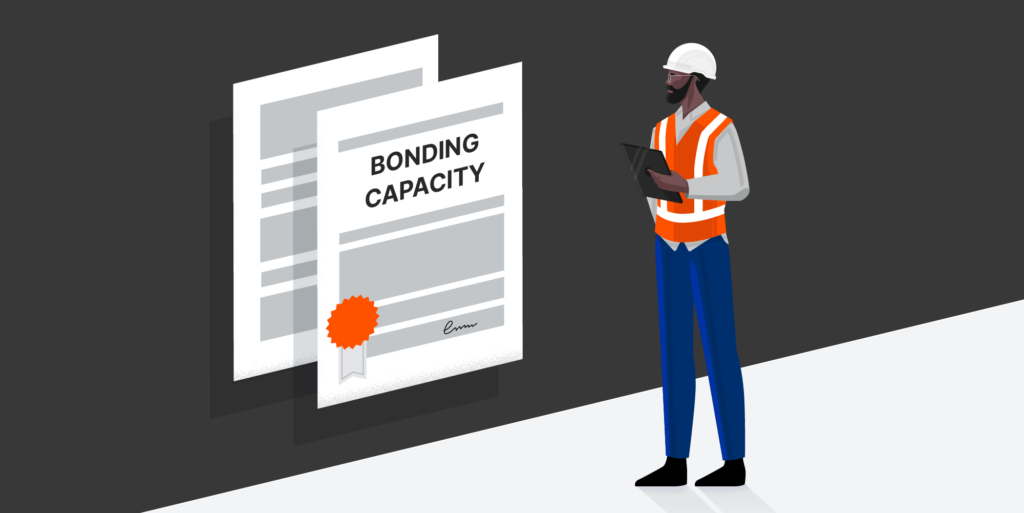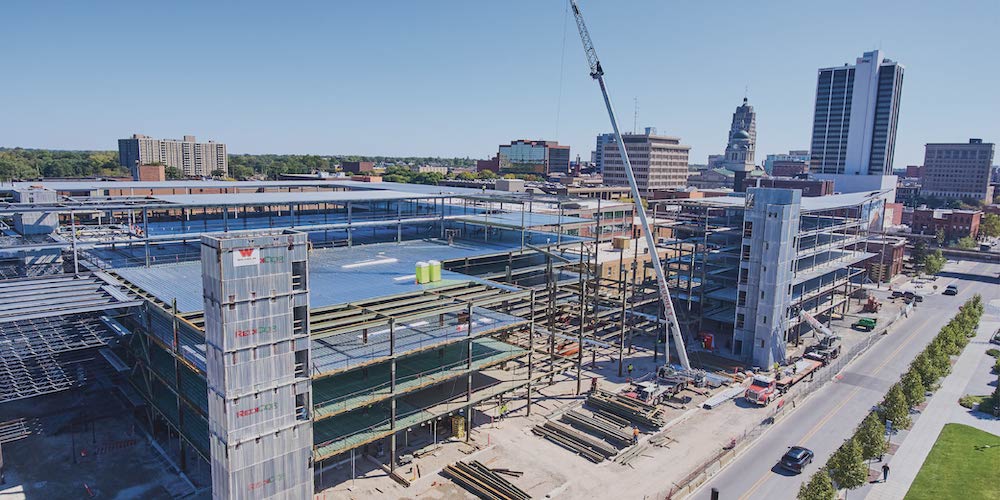— 9 min read
How to Minimize Risk on Government Construction Projects
Last Updated Mar 28, 2024

From the bidding process to regulatory requirements to payment processes, public construction projects are a different animal compared to those in the private industry. In this article, we'll explore some of the risks that are common in public construction projects, and contractor strategies to mitigate their impact.
Contents
Table of contents
Common risks in government construction
While the government isn’t likely to take the money and skip town, there are some inherent risks when working on a public job.
Increased regulation
Government activity is highly regulated and heavily scrutinized, and that includes public construction projects. To complicate matters, regulation isn't always uniform from one project to another. Federal, state, and municipal laws vary widely, and cover everything from environmental assessments to bond claim deadlines.
Failure to comply doesn't just result in financial penalties — contractors could be disqualified from bidding on future projects in some cases.
Project delays & cancellations
Public construction projects can also be highly politicized. Disruptions are common, whether from a shift in political priorities, budget shortfalls, environmental protests, or legal challenges. Previously approved funding can potentially get pulled, even for projects already in progress.
Contractors slated for work on a canceled project may need to scramble to fill the gap in their backlog.
Financial pressure
Contractors on government projects may face financial pressure at almost every stage of the project. Low bid procurement, often required on public jobs, can drive down margins. Higher startup and mobilization costs can drain bank accounts. And specialized equipment requirements can impact balance sheets and affect bonding capacity.
In addition, payment on government projects can be slow, and longer payment cycles can put more pressure on contractor cash flow. In a 2022 report from Levelset, just 23% of public contractors said they typically received payment within 30 days, compared to 31% of contractors on private commercial projects.

Risk management strategies for public contractors
It’s important to minimize risk when working on public projects. The following tips can help you hedge your bets and protect your company from an issue on a government-owned job.
Read more: An introduction to construction risk management
Prequalify the project
Prequalifying the customer or general contractor is always important, but prequalifying the project is just as paramount for public jobs. Before you submit a bid, consider whether this project is a hot-button topic. Is it controversial? Then you might want to let that job go or bid according to the risk.
Controversial projects can be the first on the chopping block when a political office changes hands. We asked Scott Grier, an 11-year construction attorney in Kansas, Missouri, and Oklahoma, what he thought about prequalifying projects.
"Before bidding on a public project, contractors should be aware of the circumstances surrounding the project,” Mr. Grier says, “including how it is to be funded, and if there is a likelihood of potential project disruption."
According to Bruce A. Inosencio, Jr., a construction attorney in Michigan and Florida with 25 years of experience, abrupt cancellations are a concern -- and it’s important to assess the potential impact on your business should that happen.
“While negotiating the terms and conditions of a contract, it is important to consider — and plan for — the possibility of the project being immediately shut down at no fault of any of the parties,” Mr. Inosencio says.
“If, for example, a project is owned by the federal government and the project ends abruptly, it would have a substantial financial impact on your business. How could the impact be calculated, and who is going to pay for it?”
There’s some risk involved in any project. But, if you can prequalify the job to identify the risk potential ahead of time, you stand a much better chance of an agreeable outcome.
Get bond information at the start
Construction attorney Samuel H. Levine has been practicing law in Illinois for 39 years. His advice to specialty contractors for minimizing risk? Keep track of bond claim rights.
“Keep track of lien rights and bond rights,” Levine says. “States and other governmental entities often require general or prime contractors to obtain a payment bond. Some states and governmental entities require a performance bond on a public project. The bond protects the governmental entity and subcontractors."
“A contractor needs to keep track of the time limits for service of notice on the bond and for filing suit to enforce a claim," says Levine.
Not knowing where to even file the claim can cost days, and you could miss your opportunity altogether.
Negotiate the termination clause
One of the significant differences between a public contract and a private one is how it allows the government body to end the work. Many of these contracts contain termination for convenience clauses that allow the operating agency to end the project at will. Negotiating that clause is key for contractors on the project.
Christopher Ng, a construction attorney in California and DC with 20 years of experience, says it’s best to plan for it upfront.
“Contractors should ensure that the termination for convenience provision provides a fair remedy to the contractor,” Ng says. For example, the contractor should be entitled to “recover the value of all labor and materials in place and they cannot be returned, plus 15% overhead and profit on such labor and materials.”
If you plan correctly for a termination for convenience, it doesn’t have to affect your bottom line as significantly.
Carol A. Sigmond, a 40-year veteran of construction law, says a termination for convenience is always going to be a risk on a public works project, but advises that contractors can take steps to balance the risk and reward -- starting with the bid.
“Bidding public works is generally a case of balancing the bid with strategic over or underweights while keeping the price low enough to win the bid, but not so low as to make the job unprofitable,” Sigmond says. “One solution to managing the termination for convenience risk is to gently front end load the requisition to the extent possible, without unbalancing it to the point that the agency is motivated to delete an item or segment of the work to gain a windfall.”
Sigmond says that managing your costs is important to limit the effect of a project shutdown. “On public projects, particularly where a termination for convenience is a risk, careful cost management and tracking is key,” Sigmond says. “Know your costs, know how to manage your costs and track them carefully to develop good historical data for the time when you might need to prove a history in a termination for convenience or equitable adjustment situation.”
Florida Construction attorney David Adelstein laid out the keys to reducing termination risk in four simple steps.
“The keys in any such circumstance are to, first, ensure there is payment for work performed including demobilization and early return fees (and costs incurred by virtue of a termination,” Adelstein says. “Second, negotiate a termination fee, if possible. Third, ensure with any suspension the time and contract amount is equitably adjusted before recommencing work. Fourth and finally, ensure with any suspension that it cannot be indefinite and after a certain number of days or period of time, the contractor is able to terminate the contract.”
Create a contingency plan
Truthfully, this is not just a public project tactic. You should be creating contingency plans for all your jobs. But, it’s particularly critical when it comes to a public project. Knowing what you can do if the agency cancels the project is a major failsafe.
E. Aaron Cartwright III, a construction attorney in Texas, stresses the importance of shoring up your bottom line with smart money management.
“Budget wisely,” Cartwright says. “Every business owner is familiar with feast or famine. When you have good times, make sure you are putting funds aside for the future. Make sure that you have other projects in the pipeline or the ability to hit the ground running if a project cancels.”
Knowing what you’re going to do if a project falls flat allows you to pivot and be nimble — key traits of a successful contractor.
Know your prompt payment rights
Without protection of a mechanics lien claim, it's vital that contractors understand payment rights on public projects.
In fact, California construction attorney George Wolff found it to be the most important lesson for contractors: “Make sure you are aware of stop notice and payment bond rights," says Wolff.
While the payment bond protects specialty contractors, there are other rights afforded to all contractors on the job. Federal and state Prompt Payment laws set deadlines for payment from the public agency to the general contractor, and for the waterfall payments down the line. Failure to make payments on time can result in hefty interest fees on top of the original contract value.
Communicate early and often
One of the best ways to avoid contract disputes and delays before they become an issue is by communicating early and often. If you need an extension or you foresee issues, you need to bring it up right away.
Sticking to the provisions of the contract, including how you submit RFIs, change orders, and other typical construction documents can reduce the chances of a dispute.
Austin S. Brown, a construction attorney in the New York and Connecticut area, stresses the importance of following the contract’s language to the letter when applying for something as simple as an extension.
“If a public contractor does not strictly conform to the public contract’s notice provisions, to the letter, the contractor risks forfeiting its entitlement to an extension of time, delay and impact costs, and even invocation of force majeure (among other things),” Brown says.
“Even worse, if the public contractor is not issued an extension of time for failure to strictly comply with notice provisions, liquidated damages can be assessed for the contractor’s failure to deliver the public works project on time.”
Categories:
Tags:
Written by
Tom Scalisi
57 articles
Tom Scalisi is a writer with over 15 years of experience in the trades. He is passionate about educating contractors and specialty contractors about the best practices in the industry. He has seen first-hand how education, communication, and preparation help construction professionals overcome challenges to build a strong career and thriving business in the industry.
View profileExplore more helpful resources

Positioning a Balance Sheet to Help Secure Surety Bonds
In construction finance, a balance sheet is a financial document that a business creates. It lists all of the business’s assets, liabilities, and owners’ equity to give a snapshot of...

The Contractor’s Guide to Increasing Bonding Capacity
Contractors who want to work on bonded construction projects will need bonding capacity — the ability to secure a bond to help protect the owner against performance, default, financial or...

How Construction Payment Bonds Work — and Why They Matter
From the smallest home renovation to the largest public works project, the world of construction is backstopped by one fundamental principle: Trust. Owners and public agencies must be able to...

Performance Bonds for Construction Explained
Performance bonds provide a guarantee that a contractor will fulfill all of their obligations under a construction agreement. Performance bonds are a subset of contract bonds and guarantee that a...
